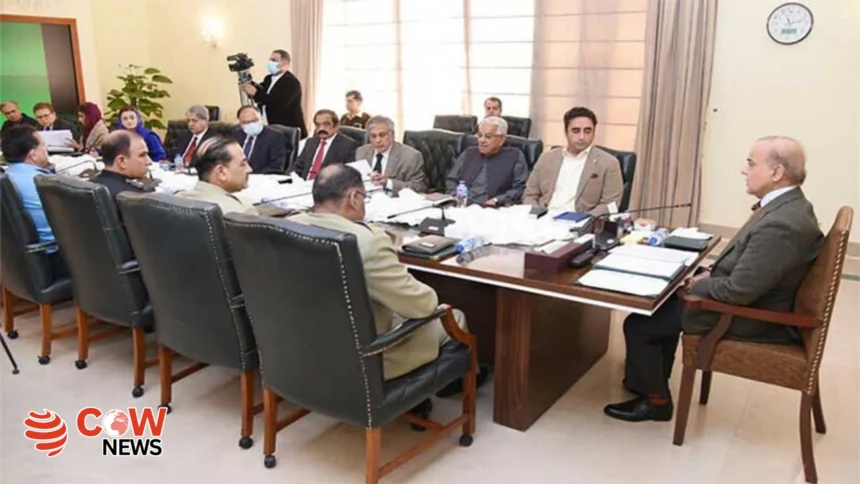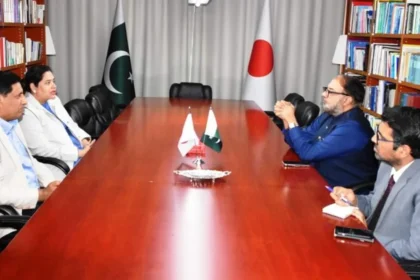ISLAMABAD – An all-important National Security Committee (NSC) meeting will be held here on Thursday to contemplate a suitable response to the actions taken by India following the Pahalgam attack.
Twenty-seven people were killed and 17 injured when suspected militants opened fire at tourists in India’s Jammu and Kashmir territory Pahalgam. This is said to be the worst such attack in the country in nearly two decades.
The ghastly incident triggered blame game between Pakistan and India, with both sides blaming each other of orchestrating the attack for ulterior motives.
Following a cabinet meeting chaired by Indian Prime Minister Narendra Modi on Wednesday, India announced the suspension of the Indus Waters Treaty with Pakistan, closure of Attari check post and other measures.
Later, Pakistan’s leaders decided to have a high-level meeting to be chaired by Prime Minister Shehbaz Sharif to come up with an effective response to India’s belligerence.
The meeting will discuss India’s irresponsible actions after what Pakistan calls Pahalgam’s false flag operation.
Senior civil and military leadership will deliberate upon internal and external situation, which has arisen after the Pahalgam incident. The top leaders will also take up India’s hasty and imprudent decision which is being equated with “water aggression”.
On Wednesday, Defence Minister Khawaja Asif said in a statement that a “session of the National Security Committee will be held under the chair of Prime Minister Shehbaz Sharif.”
He stated that decisions would be taken to give “an appropriate response to the Indian steps.”
In another statement, the defence minister said Pakistan condemned terrorism wherever it occurred in the world.
“India’s allegation against Pakistan after the Pahalgam incident is inappropriate,” Asif said at a private news channel. He added that Pakistan was the most affected country by terrorism and had been bearing the brunt of the menace for decades.
He questioned how Pakistan could resort to terrorism while being a victim to the scourge.
“There should be no ambiguity that we strongly condemn terrorism,” the defence minister said. He said the possibility of a “false flag operation” could not be ruled out.
INDIA’S RESPONSE TO MASSACRE
The Indian cabinet announced the suspension of the Indus Waters Treaty with Pakistan and the closure of the Attari check post in the aftermath of the attack.
At a press conference, the Indian Ministry of External Affairs also declared the cancellation of all visas issued to Pakistani nationals, instructing those currently in India to leave the country within 48 hours.
India has also suspended visas issued under the SAARC framework for Pakistani citizens.
A spokesperson said the Indian nationals residing in Pakistan must return via the Attari border crossing by May 1.
India has declared all military, naval, and air advisers in the Pakistani High Commission as “persona non grata” and recalled its own defence attaché from Pakistan.
The entire staff of Pakistan’s High Commission in India has been given seven days to return to Pakistan. Furthermore, India has announced a reduction in its diplomatic staff in Pakistan from 55 to 30 by May 1.
PAKISTAN’S CONCERNS
Pakistan expressed deep concern over the attack in the Pahalgam area of the occupied Jammu and Kashmir (IIOJK) which claimed the lives of 27 people and left 17 injured.
Foreign Office spokesperson Shafqat Ali Khan said in a statement on Wednesday that Pakistan was “saddened by the incident and expressed sympathy with the families of the deceased.”
He said: “We extend our condolences to the near ones of the deceased and wish the injured a speedy recovery.”
The spokesperson added that “we are concerned at the loss of tourists’ lives in an attack in Anantnag district of Indian Illegally Occupied Jammu and Kashmir.”
ANALYSTS BERATE INDIA FOR SPEWING HATE
Defence analysts and leaders in Pakistan said India kept alive its tradition of levelling baseless allegations against Pakistan.
They said its propaganda machinery started churning out accusations of Islamabad’s involvement in the occupied Kashmir incident.
The Indian media, they said, had been using such attacks without evidence to fuel anti-Pakistan sentiments. In reality, these accusations are often pre-meditated and used to spew venom against Pakistan.
Terrorism has no religion, but India consistently tries to associate it with Muslims and Pakistan.
The Indian social media accounts started tweeting with the hashtag #PakSponsoredTerror, within 30 minutes of the Pahalgam attack. Moreover, BJP leaders JP Nadda and Amit Shah posted tweets about the incident within half an hour after the incident, sources said.
WHAT HAPPENED IN PAHALGAM?
As many as 27 people were killed and 17 were injured when suspected militants opened fire at tourists in Pahalgam.
The attack took place on Tuesday in the popular destination of Pahalgam in the scenic Muslim-majority territory, that has seen a resurgence in mass tourism as insurgent violence waned in recent years.
The attack occurred in an off-the-road meadow and the dead included 25 Indians and one Nepalese national, police said.
It was the worst attack on civilians in India since the 2008 Mumbai shootings in which more than 160 people were killed.
On Wednesday, over a dozen local organisations called for a shutdown in the federal territory to protest against the attack on tourists, whose rising numbers have helped the local economy.
Many schools also suspended classes for the day in protest.
Airlines were operating extra flights from Srinagar, the summer capital of the territory, as visitors were rushing out of the region, officials said.







